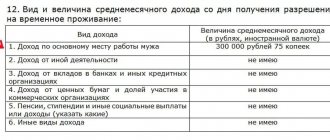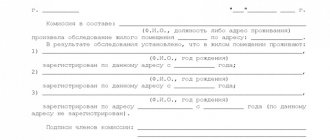Misprints in legally significant documents actually limit people's rights. If there are inaccuracies in the entries in the work book - they will not confirm the length of service, there is an error in the registration documents for the land plot - you will not be able to dispose of the plot. When receiving any document, it is extremely important to study it carefully. A mistake made not through your fault, but in your documents, will create difficulties primarily for you, and sometimes also for your heirs. Not all errors can be corrected by contacting directly the authority that issued the document or made the recording; often the only option is to go to court. For these cases, civil procedural legislation provides for such a procedure as establishing a fact of legal significance. For example, the fact that a title document belongs to a person whose name, patronymic or surname indicated in the document does not coincide with the name, patronymic or surname of this person indicated in the passport or birth certificate. Also, the issue of making corrections or changes in civil status records can be resolved in court.
Let's take a closer look at how to correct this or that typo or establish the fact that a document with an error belongs to its owner.
Establishing a fact of legal significance
A fact of legal significance is understood as a circumstance on which the emergence, change, or termination of personal or property rights of citizens or organizations depends. The subject of proof in this case is to establish the fact that a document with an error belongs to a specific person.
The court establishes facts of legal significance in two cases:
- if this cannot be done in any other order;
- if it is impossible to restore lost documents.
Thus, if a clerical error in a document cannot be eliminated by contacting the authority that made the recording or issued the document, or if the document is missing altogether, you should go to court. If it's not a passport; certificate issued by the civil registry office; military document - an application is submitted to establish a fact of legal significance.
For example, if in your passport you are “RustEm”, and in the certificate of registration of property rights you indicated the name “RustAm” by mistake, or “Kazakov” suddenly became “KOZAKOV”, and “AbduLLovich” accidentally changed to “AbduLovich”, you will not be able to make any registration actions with your property. If the property right was registered a long time ago, Rosreestr may refuse the application to correct the clerical error. In this case, it is possible to establish the fact that the document belongs to its real owner only by applying to the court with an application to establish a fact of legal significance.
The court decision will confirm the fact that the document with the error belongs to its owner, and in relation to the fact subject to registration, will serve as the basis for such registration.
Required Applications
The Code of Civil Procedure states that the applicant is required to provide evidence confirming that it is impossible to establish the fact without the participation of judicial authorities.
For this purpose, for example, documents confirming the refusal of a government agency to issue the relevant certificate can be used.
In addition, if possible, it is advisable to provide documentary evidence of the arguments contained in the appeal.
When a fact cannot be established without testimony, you can draw up a separate document with a request to call them or declare such a need in the main statement.
The application must be accompanied by a receipt confirming payment of the state fee, as well as a power of attorney (if the application is submitted through a representative).
It is also required to submit to the judicial authority copies of all papers according to the number of persons involved.
What facts can be established in court?
Due to errors and inaccuracies, facts can be established in court (Article 264 of the Civil Code of the Russian Federation):
- family relations;
- registration of birth, adoption, marriage, divorce, death;
- ownership of title documents to a person whose name, patronymic or surname indicated in the document does not coincide with the name, patronymic or surname of this person indicated in the passport or birth certificate, etc.
This list is not exhaustive; other facts of legal significance may be established. For example, quite often they go to court upon retirement to confirm their work experience, which, due to some inaccuracies, cannot be established on the basis of available documents. In this case, the applicant can present in court certificates from the archives, petition to call witnesses, and present other evidence confirming his work experience.
In addition, the court may establish facts that are not related to errors in documents: the fact of being a dependent; the fact of recognition of paternity; the fact of ownership and use of real estate; fact of an accident; the fact of death at a certain time and under certain circumstances in the event of a refusal by the civil registry authorities to register the death; the fact of acceptance of the inheritance and the place of opening of the inheritance, etc.
Currently, the case of establishing the fact of permanent residence in the territory of the Republic of Crimea or in the territory of the federal city of Sevastopol is widespread. In accordance with the Resolution of the Constitutional Court of the Russian Federation dated October 4, 2016 N 18-P, if it is impossible for a citizen of Ukraine to submit to the authorized body registration documents confirming the fact of his permanent residence in the territory of the Republic of Crimea or in the territory of the federal city of Sevastopol as of March 18, 2014, such the fact may be established by a court of general jurisdiction on the basis of other legally permissible evidence.
Correction of typos in passports, certificates (issued by the Civil Registry Office) and military documents
The above-mentioned article of the Civil Code also clarifies that correcting typos in passports, certificates issued by civil registry offices, and military documents does not relate to establishing facts of legal significance, since it is possible to correct errors or make corrections in civil registry records out of court.
Correcting a typo in a passport
If there is a typo in your passport, you should simply apply for a replacement document. In accordance with the Decree of the Government of the Russian Federation dated 07/08/1997 N 828 “On approval of the Regulations on the passport of a citizen of the Russian Federation, a sample form and description of a passport of a citizen of the Russian Federation,” a passport is replaced if inaccuracy or error in the entries made in the passport is detected. To do this you should prepare:
- application for passport replacement in Form No. 1 P;
- passport to be replaced;
- two personal photographs measuring 35 x 45 mm.
Correction of a typo in the certificate issued by the registry office
If you need to make changes to a document issued by the Civil Registry Office:
- We draw up an application for a correction or change in the civil status record according to Form No. 23.
- We attach to it:
- identification document;
- the document to which the change needs to be made;
- a document confirming the need for changes; For example, if there is a spelling mistake in the surname on the child’s birth certificate, you can attach a copy of the father’s passport.
- a document confirming authority (if a legal representative or authorized representative applies);
- a document confirming relationship or interest and a death certificate (if corrections need to be made to the document of the deceased).
The state fee does not need to be paid if corrections or changes are made to civil status records due to errors by civil registry office employees. You need to contact the registry office that issued you the certificate to which you need to make a correction, or the registry office department at your place of residence.
If the registry office receives a refusal, you should contact the court at your place of residence with an application to make corrections or changes to the civil status record. The court decision will serve as the basis for correction of the record by the registry office.
Status of the judicial act
It is used as a missing link in the list of documentation that serves to grant certain rights. The act becomes necessary if inaccuracies are made.
For example, the document granting housing rights contains the owner’s first or last name by mistake, making it impossible to exercise housing rights.
The first and last names contained in the passport and birth certificate are considered correct.
If the body that issued the administrative document has ceased to exist, there is no one to formally correct the error.
Authorities that were created to replace others are not considered as successors. They cannot issue a new document to replace the old one.
It is required to establish that the document belongs to the applicant by the judicial authorities. The use of such a procedure is not allowed if it is established who owns a military document, passport, or certificate obtained from the civil registry office.
The above example shows that obtaining a document from a judicial authority is necessary in order to subsequently submit it to the body that deals with the issue of interest to the citizen.
It is reasonable to submit a judicial act only after it has become valid after the deadline for filing an appeal has expired. The date on which the decision becomes valid is confirmed by a special seal and inscription, which are affixed by clerical workers.
Statement on establishing a fact of legal significance
An application to establish a fact of legal significance is submitted in accordance with special proceedings (Chapter 28 of the Code of Civil Procedure of the Russian Federation). The main difference between special proceedings and the usual lawsuit is that it is one-sided. There is no dispute and, therefore, no disputing parties. The participants in the process are: the applicant and the interested party. Nevertheless, the court is competent to consider this case. The application contains the following information:
- about the court to which the application is being filed;
- about the applicant;
- about the person concerned.
An interested party could be, for example:
- a notary who refused to perform a notarial act due to a typo in the document;
- the local Administration, which refused to make changes to the title documents;
- The Rosreestr Office, which did not register the transaction;
- Administration of the Pension Fund of the Russian Federation, which did not count the length of service, etc.
Such a statement is not a claim! The title states: “Statement to establish a fact ... (states the fact that needs to be established)”
After this, the essence of the case is stated, what inaccuracies and errors were made, in which documents, what fact should be established.
Must be indicated:
- For what purpose is it necessary to establish this fact? For example: to open an inheritance case, to complete a purchase and sale transaction, to register rights, etc.
- Reasons for the impossibility of establishing this fact out of court. Evidence must be provided to support your arguments. For example, a notary’s refusal to perform a notarial act or Rosreestr’s refusal to amend the title documents is attached.
Having examined the totality of all available evidence, the judge will make a decision on the basis of which changes can be made to the title documents.
State duty for establishing a fact of legal significance
As we said earlier, cases of establishing facts of legal significance are considered in a special proceeding. Paragraph 8 of Article 333.19 of the Tax Code of the Russian Federation stipulates that when filing an application in cases of special proceedings, a state duty of 300 rubles is paid.
Jurisdiction of statements to establish facts of legal significance
District courts are competent to consider such applications. As a general rule, an application should be filed with the court at the place of registration of the applicant. The exception is when it is necessary to establish the fact of ownership and use of real estate; the application is submitted to the court at the location of the real estate.
How to write a document correctly
To begin the procedure required to establish facts of legal significance, it is necessary to draw up an application in compliance with certain requirements.
It requires information about:
- the name of the judicial authority (the first instance for considering such cases are district courts);
- information about the applicant (full name, address, zip code, telephone number);
- information about interested parties (name of the institution, its address, telephone number);
- the circumstances that gave rise to the application to the judicial authorities;
- reasons for which the establishment of a certain legal fact is required;
- evidence confirming the applicant’s appeal to the authorized bodies;
- list of documentation attached to the application;
- date on which the application was submitted, signature.
It is necessary to attach documentation that confirms that the state duty has been paid.
Copies of the application and other papers must correspond to the number of persons participating in the case, plus another package of documents is submitted to the judicial authorities.
Attention! Our qualified lawyers will assist you free of charge and around the clock on any issues. Find out more here.
Can the court refuse?
The court may refuse to recognize a legal fact if:
- there are other extrajudicial ways to establish it;
- during the consideration of the case, the existence of a dispute about the law is established;
For example, other heirs of the deceased are announced. In this case, the court issues a ruling to leave the application without consideration. At the same time, in the ruling, the court explains to the applicant and other interested parties their right to apply to the court with a statement of claim for similar requirements.
- the fact has no legal significance;
- jurisdiction is incorrectly determined.
Legislative basis
Important! The main act that regulates this procedure is the Code of Civil Procedure of the Russian Federation. This process is described in Chapter 28, Art. Art. 264-268.
They contain information about:
- a list of facts that are confirmed by such a procedure;
- conditions that must be met for the application to be accepted by the judicial authority;
- rules for determining jurisdiction (when and to which court authorities to file an appeal);
- approximate requirements for application;
- legal meaning of a judicial act.
What is the ratio of special proceedings and fact-finding cases that have legal significance?
The second is considered as part of the first.
It is customary to view this type of case as something completely separate. Such production has features characteristic only of this procedure.
A typo in the court decision
The final authority in correcting typos and inaccuracies is the court, but what if there was also a typo in the court decision?
Article 200 of the Code of Civil Procedure of the Russian Federation stipulates that the court does not have the right to change its decision, but it can correct a typo in it, on its own initiative or at the request of the participants in the process.
In the application for correction of a clerical error, it should be stated in detail: in the decision on which case, what specific clerical errors were made, and how they should be corrected.
An application to correct a clerical error is considered by the court within ten days from the date of its receipt without holding a court hearing and without summoning the participants in the process. However, if necessary, the judge can still notify and summon the persons involved in the case.
Be careful! Until October 1, 2021, a different procedure for considering applications to correct clerical errors was in effect (this issue was considered in a court hearing with notification and summoning of the participants in the process).
Based on the results of consideration of the application, the court issues a ruling to correct the clerical error. Within 3 days from the date of its issuance, it is sent to the persons participating in the case; after 15 days it enters into legal force. It should be attached to the court decision as confirmation of the corrected inaccuracies.
Consideration of the application on its merits
When considering such applications, the general procedure applies. The judge determines whether the document is drawn up correctly and whether there are any circumstances preventing the start of the process.
Copies of the ruling on the opening of proceedings, copies of papers and subpoenas are sent to interested citizens. A copy of the decision and summons is sent to the applicant.
If necessary, the judge provides clarifications or asks questions. When establishing legal facts, the judge has the right to independently demand evidence. In a lawsuit, this right has significant limitations.
At the same time, applicants are still required to provide evidence, arguments, and explanations regarding their position.
When considering an application, the court examines any documents related to the case; this is not limited in any way by law.
Witnesses are called using the general procedure. First, the applicant or his representative provides explanations regarding the information that can be provided by the witness, after which the judge decides on the possibility of calling him.
The judge is the only civil servant who has the right to use testimony and documentation indirectly related to the case to substantiate his conclusions.
This is a feature of his work; for others, there is an obligation to be guided by the documentation, which is collected according to an established list.
Note! The application must be considered by the judge within two months from the date on which he issued a ruling in accordance with which it was accepted for proceedings.
The decision is formalized in the form of a definition. You can appeal it within a month.





